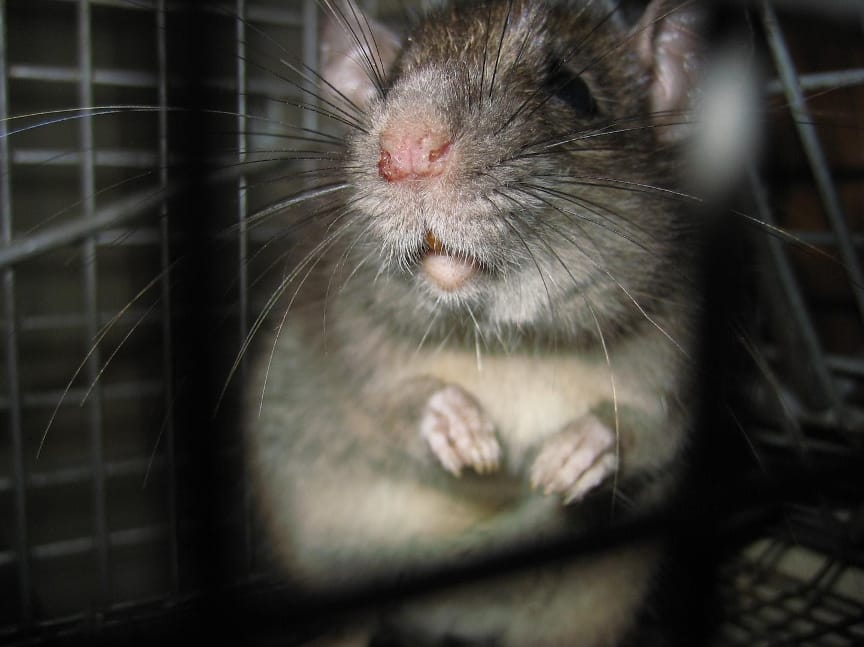
For the next two months, the Environmental Awareness Group (EAG) will be focusing its efforts on ‘eradicating’ Green and Smith Islands, that is, removing harmful invasive rats from their shores to conserve threatened habitats and safeguard native wildlife populations.
Getting rid of every single rat on any land mass might seem like a daunting task to many, but fortunately, a notable track record of invasive alien species removal by the Offshore Islands Conservation Programme (OICP) on Antigua & Barbuda’s offshore islands has adequately prepared the EAG to embark on such an ambitious endeavour.
Decades of experience in this arena not only reassures us that rat-free terrestrial ecosystems are attainable, but worthwhile. Since 1995, the OICP has removed rats and other invasive pests from 16 islets within the North East Marine Management Area (NEMMA). We can look at thriving offshore island ecosystems like Great Bird Island today as demonstrations of the hard work that enabled the incredible recovery of the native wildlife and ecosystems on these islands and given them the opportunity to heal, and flourish.
This pristine island state is what we seek to achieve on Green and Smith Islands with this year’s eradications. As one of Antigua’s largest offshore islands, Green Island contains nationally rare and vulnerable forest habitats and plants, and is a crucial refuge for native and migratory birds such as the Red-billed Tropicbird and the vulnerable West Indian Whistling Duck. Furthermore, the island supports the greatest population of critically endangered Antiguan Racers on the planet; only further driving home how imperative it is that we preserve these globally significant wildlife populations.
Although this is the first year that Smith will be undergoing an eradication, Green Island has previously been declared rat-free three times in the past (2001, 2006, 2012) without being able to withstand the test of time. The proximity of these islands, both to each other and the mainland, as well as their frequent visitation by tourists and locals alike, makes maintaining an “invasive mammal-free” status incredibly challenging— but not impossible, we believe.
“Invasive alien species like rats are known to have a devastating impact on native wildlife by preying on native and endemic species, who evolved without natural defenses to them. This results in lower numbers and diversity of our species and negatively impacts these ecosystems” explains Invasive Species Officer, Nathan Wilson. “The eradication will be conducted from 5 July – 30 August 2021 and will consist of the removal of rats through the cutting of trails and careful dispersal of bait followed by an intensive monitoring period to ensure its success.”
Our approach this year is unique, and will be successful, for several reasons. Firstly, the eradication team largely consists of locals—half of the team stationed on Green Island is Antiguan with technical support from international expert Robert Williams. The eradication on Smith Island is being led by local experts, Tahambay Smith and Sean Lee, who have worked tirelessly throughout the years to keep invasives from reinvading our offshore islands. Having the expertise on island to remove invasive species is critical to building local capacity for identifying signs of future reinvasions, and being able to address those signs before these pests establish themselves and wreak havoc.
“The eradication will be mutually beneficial as it ensures continued survival of endangered species and threatened habitats, while simultaneously building capacity among young Antiguans and Barbudans. Our local volunteers will continue to maintain the invasive mammal-free status of 12 offshore islands of global conservation importance.” says Shanna Challenger, OICP Coordinator. “This not only adds to the aesthetic and ecological value of our offshore islands and their surrounding seas – locals, tour operators and visitors alike who spend time on the offshore islands mutually benefit by having use of a rat-free environment.”

Secondly, this year we intend to strengthen monitoring measures around these islands through the development of a “Reinvasion Prevention Plan.” This plan recognizes the mainland will always be close to these islands, and there will always be an influx of visitors to their shores, but hopes that by strengthening our biosecurity measures and engaging the island-users who benefit from the rat-free ecosystems, we can collectively prevent further reinvasions. Therefore, the EAG will be teaching and training staff at the Mill Reef Club, tour operators, fishers and boat owners in invasive species detection measures, so that we can all work together for the benefit of people and wildlife.
“We are truly appreciative of the conservation efforts the EAG has done on the Mill Reef offshore islands over the years. The Club community is committed to see these islands thriving and pest-free and we are proud to provide support during this eradication.” says Daniel Brown, Managing Director of the Mill Reef Club.
This eradication, the fourth of its kind, is proof that conservation work can never be sustainable without the enthusiastic support and participation of all Antiguans & Barbudans. Dr. Helena Jeffery Brown, Technical Coordinator of the Department of the Environment says, “This eradication will be yet another example of how this country is meeting the national and international commitments it has made to conserve biodiversity.”
We look forward this year, then, to the active investment of every local who visits the offshore islands for their remote, untouched beauty, in a rat-free future for Green and Smith Islands. For more information about the eradication or the OICP, please contact the Environmental Awareness Group at 1-268-462-6236 or [email protected].
The Offshore Islands Conservation Programme (OICP) is a collaborative partnership between the Environmental Awareness Group (EAG), Fisheries Division, Department of Environment (DOE), Ministry of Tourism and Investment, Forestry Unit, National Parks Authority, and Fauna & Flora International (FFI). This partnership is working towards a Vision of Adaptively managed, flourishing offshore island ecosystems where wildlife thrives, people are meaningfully engaged, and sustainable use is valued and practiced for the benefit of all.
This eradication effort was made possible through funding support from the Global Environment Fund (GEF) under Component 2: Control and Management of IAS Impacts (Antigua and Barbuda pilot) of the “Preventing Costs of Invasive Alien Species in Barbados and the OECS countries” project; and with additional support from the U.S. Fish & Wildlife Service Neotropical Migratory Bird Conservation Act (NMBCA) grant “Improving and Conserving Critical Bird Habitat on Antigua’s Offshore Islands”.
Advertise with the mоѕt vіѕіtеd nеwѕ ѕіtе іn Antigua!
We offer fully customizable and flexible digital marketing packages.
Contact us at [email protected]
















Kill every one of those crazy rats, and all the snakes, too. They must die.
Start out with the head rat Gaston Browne.
Comments are closed.